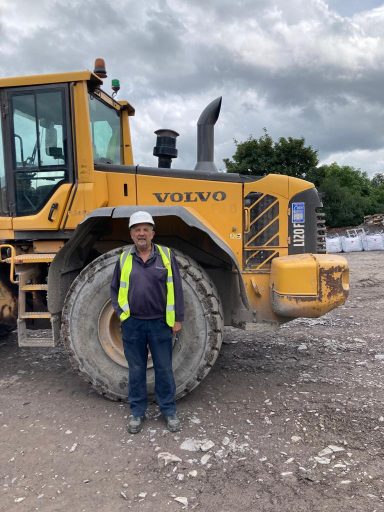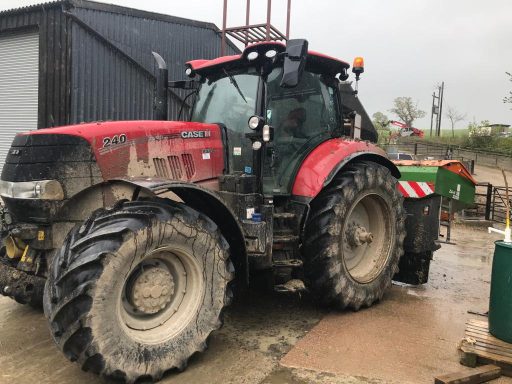
Advice is Free, Training is Priceless




Training for the Future offers quality, affordable training for land and construction based industries in a friendly and practical environment.
We are a fully Accredited Test Centre and work in partnership with the UK's leading providers to deliver safe, up-to-date training and qualifications to meet your individual needs.
Practical solutions with a Common sense approach
Our aim is to provide good, honest advice to enable you to identify your training requirements ensuring you can make an informed decision on your training needs.
Our training is tailored for both experienced operators requiring a refresher to novice trainees needing a more extensive approach.
NPORS

National Plant Operators Registration Scheme
Training for the future is fully accredited in providing NPORS training.
Our instructors are able to deliver training and assessments for operators on industrial, construction and power work equipment.
Many of the courses are delivered on a one to one basis, in a friendly relaxed environment.
The main objective of NPORS is to allow a flexible approach to meet the needs of the employer and to help and assist in providing an adequately trained workforce.
The NPORS operator registration card is produced for an individual who has successfully completed a practical and knowledge based assessment of the categories shown on the reverse of the card.

Categories
- Industrial Counterbalance Lift Truck N001
- Rough Terrain Lift Truck N009
- Telescopic Handler N010
- Telescopic Handler Suspended Loads N138
- Excavator as a Crane N100
- Mobile Crane N101
- Lorry Loader N107
- Slinger / Signaller N402
- Micro Excavator 360 up to 1 Tonne N016
- Tiltrotator System N020
- Forward Tipping Mini Dumper N139
- Excavator 180 N201
- Excavator 360 N202
- Forward Tipping Dumper N204
- Road Roller N214
- Plant Mover - Non Operational Duties N132
- Plant Machinery Marshall N133
- Vehicle Marshall N403
- Rear Tipping Dumper N205
- Loading Shovel N209
- Skidsteer Loader N212
- Dozer N215
- Agricultural Tractor N601
- Quick Hitch Awareness N726
- Excavation Marshall N027
- Plant Loader and Securer N120
- All Terrain Vehicle Sit Astride N608A
- MEWP Boom N108
- MEWP Scissors N109
- Abrasive Wheels - Hand Held Petrol Driven Cut Off Saw N017
- Abrasive Wheels N301
- Chainsaw - Maintenance & Cross-Cutting N602
- Manual Handling N704
- Safety Awareness S001
- Crusher N207
- Screener N208

For friendly advice on which course is right for you, please contact us today

CPCS/NOCN

The Construction Plant Competence Scheme (CPCS) was created from a need of construction and allied employers requiring recognition of competence for their plant and machinery operators.
The original CTA Scheme itself was adopted by industry as the standard bearer. Its purpose was to provide a safe operating skills and site safety knowledge through training and was a leading player in adopting the Health and Safety Test.
The Industry needed to improve safety, led by initiatives such as Rethinking Construction and Revitalising Health and Safety agendas, meant that a common competence scheme was required. This was bolstered with the formation of organisation such as the Confederation of Construction Clients and the Major Contractors Group who set minimum safety standards and fostered the implementation of a single card scheme for the industry under the umbrella of the Construction Skills Certification Scheme (CSCS).
Industry members of the CTA Scheme Management Committee spent three years devising a competence-based scheme, with widespread consultation with federation, organisation, employers, operators and stakeholders. All supported the need for a simple, robust yet pragmatic system.



Red 'Trained Operator' Card
The CPCS Red Trained Operator Card is issued on successful completion of the CPCS Theory and Practical Technical Tests which must be taken with a CPCS accredited test centre.
Learn which theory and practical test you need to complete in order to gain a Red Trained Operator Card.
To get this card you need to (in this order):
- Pass the relevant CITB health, safety and environment test.
- Achieve the CPCS theory test (within two years of the CITB health, safety and environment test)
- Achieve the CPCS practical test (within six months of the CPCS theory test and within two years of the CITB health, safety and environment test).
Both CPCS theory and practical tests are delivered by an approved CPCS test centre. The test centre will apply for the card.

Blue 'Competent Operator' Card
The Blue Competent Operator Card has a five-year life and is renewable.
The Blue Competent Operator Card confirms you have demonstrated a level of health, safety and environment awareness through the CITB health, safety and environment test, underpinning knowledge through a CPCS theory test, operating ability through a CPCS practical test and operating competence on the type of plant evidenced by a VQ.
Blue Competent Operator cardholders have demonstrated their ability to work unsupervised, and may, in fact be called upon to supervise Red Trained Operator cardholders on the worksite.

Green Labourers Card
The Labourer card is specifically for people carrying out labouring duties.
This card is valid for five years. It is currently not possible to renew a Labourer card. However, you can apply for a new Labourer card when your existing card expires.
Card Requirements
- Take and pass the CSCS Health, Safety & Environment Test (50 multiple choice questions) £40 per person
- NPORS Construction Safety Awareness Course (1 Day) £155 + VAT
- Application of card (online) £36

Categories
- Excavator 180 - Wheeled A10/A12
- Forward Tipping Dumper A09
- Excavator 360 (Crawler and Wheeled) A59
- Telescopic Handler (All sizes) A17
- Articulated Dump Truck (All sizes) A56
- Crawler Tractor / Dozer A34
- Agricultural Tractor A33
- Lorry Loader (Hook, Clamshell, Clamp) A36
- Ride on Roller A31
- Rough Terrain Forklift / Masted Truck A14
- Industrial Forklift A16
- Slinger Signaller A40
- Mobile Elevating Work Platform A25/A26
- Loading Shovel (Wheeled / Tracked) A21
- Dump Trucks A57

To find out more about the courses we offer, please contact us today

LANTRA
National Proficiency Tests Council
NPTC
NPTC offer an assessment only. Usually a Lantra Awards “training only” course is required in order to cover items for assessment, as there is no such thing as an “NPTC training course”.
Technically, there is no legal requirement for training before sitting an NPTC
assessment, however, without appropriate training, a candidate is very unlikely to pass the assessment – unless they are exceptionally experienced, fully aware of all relevant current health and safety aspects and fully conversant both theoretically and practically with current chainsaws and techniques.

Integrated Training & Assessment
ITA
The instructor trains and assesses the candidate on the training course itself.
In both cases the trainee is assessed, so they have a Certificate of Competence.
For example; Chainsaw training is progressive, you can’t take Stage 3 for example without
passing Stage 1 first and then Stage 2, and the further the progression, the more apparent the difference becomes between Lantra Awards and NPTC.
Categories
- Pest Control
- Ground Care
- Rough Terrain Masted Lift Truck
- Dump Trucks
- Forward Tipping Dumper
- Excavator 180
- Excavator 360
- Brush Cutters & Trimmers
- Tractor Driving
- Safe use of Wood Chippers
- Chainsaw Maintenance & Cross Cutting
- Chainsaw Maintenance, Cross-cutting, felling & Processing Trees up to 380mm
- Felling small trees up to 380mm inc takedown of hung-up trees using hand tools
- Felling medium trees 380mm-760mm
- Safe use of Pesticides
- Hydraulic Nozzle & Rotary Atomiser
- Handheld Applicators & Rotary Atomiser
To find out more
Funding Partnerships
Training for the Future are proud to be working with the following bodies to provide quality training, qualifications and certifications that have successfully applied for funding. For more information please click on the relevant picture to be taken to the hosts website.
Farming Connect
Farming Connect' enhanced programme is providing support which is transforming the business prospects of thousands of farmers and foresters.
Many services are fully funded, others are subsidised by up to 80%
Focus on Forestry First
If you work with Trees & Timber in Wales and need support for Training, FFF can help you access funding.
The Forestry Focused Future funding scheme concentrates on fostering knowledge transfer and innovation through skills & learning. The aim is to enable the trees and timber businesses of Wales to thrive and look forward to a more secure future.
ReAct
ReAct+ offers tailored solutions which may include financial support, skills training and Personal Development Support to help remove barriers to employment, such as support with mental health, confidence building, language skills and more.
ReAct+ is a new grant programme that builds on the success of previous programmes and is part of the Welsh Government’s Young Persons Guarantee.
Communities for Work
Communities for Work is a community based advisory service working to increase the employability of individuals who are not in employment, education or training and who face complex barriers to employment.
Communities for work can provide support to help to build your confidence, gain some work experience, learn new skills or re-write your CV. Communities for work will help you as an individual and will meet with you in your local community.
Communities for work is a Welsh Government programme which is supported by the European Social Fund.

We need your consent to load the translations
We use a third-party service to translate the website content that may collect data about your activity. Please review the details in the privacy policy and accept the service to view the translations.


















